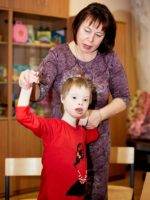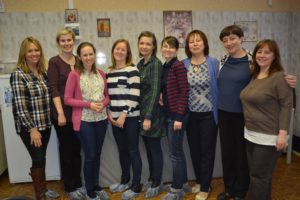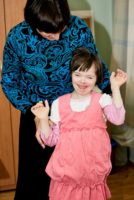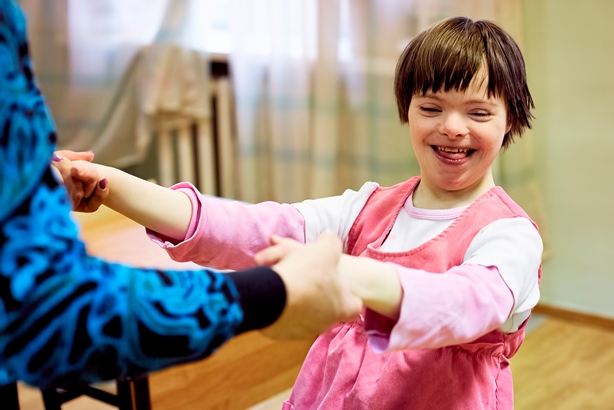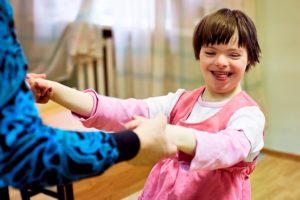 It has finally happened! Diema’s Dream conducted the first pilot project of the ‘Portage’ method in an orphanage in Moscow!
It has finally happened! Diema’s Dream conducted the first pilot project of the ‘Portage’ method in an orphanage in Moscow!
This is a huge success for us! The “Portage” method has proved itself across the globe as a successful and effective model of work on social adaptation, habilitation, rehabilitation and progress of children with developmental disabilities. It is very simple and at the same time has an effective algorithm of consisting of simple actions and basic principles, tested consistently over the years.
And in Russia there is a very high success rate in applying the Portage method in orphanages such as the Elatma`s orphanage for mentally disabled children in the Ryazan Region. Children there were diagnosed with severe and multiple developmental disorders, previously described as “recumbent” and “undeveloped” – yet now have been successfully developing and growing for more than ten years!
However, little is known about this experience. Therefore, thanks to funding from our partners, in turn we have been working for several years to launch the Portage project in the capital of Russia. Moscow was chosen as the first place to test out our project as the probability of the method spreading is much higher in this region due to it having the highest population number by far in comparison to any other city in Russia, meaning there is a better chance that more children can be helped.
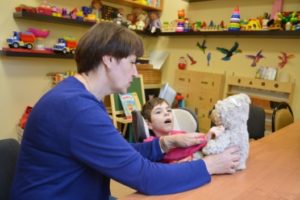 Hence, the pilot project “Portage” was held for six months, from December, 2016 until May, 2017, at the Center for the Promotion of Family Education “Doverie”. The purpose of the pilot project was the introduction of activities on the model of social practice “Portage” to work with children of “Doverie”, by forming a team of specialists who know the method. Luckily, this goal was achieved – a team of “Doverie” was formed and trained, where experienced consultants were provided with daily methodical support with the children.
Hence, the pilot project “Portage” was held for six months, from December, 2016 until May, 2017, at the Center for the Promotion of Family Education “Doverie”. The purpose of the pilot project was the introduction of activities on the model of social practice “Portage” to work with children of “Doverie”, by forming a team of specialists who know the method. Luckily, this goal was achieved – a team of “Doverie” was formed and trained, where experienced consultants were provided with daily methodical support with the children.
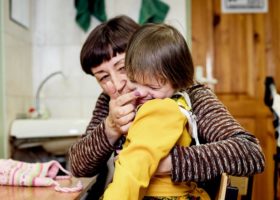 Sessions were conducted by three specialists with six children, working individually with each child for at least one hour a day, five times a week. As a result, a total of 396 sessions were conducted during the project. All children, in relation to their individual abilities, had developed skills in areas such as infant stimulation, small and large motor skills, self-service, cognition, socialisation and speech.
Sessions were conducted by three specialists with six children, working individually with each child for at least one hour a day, five times a week. As a result, a total of 396 sessions were conducted during the project. All children, in relation to their individual abilities, had developed skills in areas such as infant stimulation, small and large motor skills, self-service, cognition, socialisation and speech.
Overall, these children have acquired seventeen new skills and 12 skills in the process of being worked towards. Especially important achievements to be considered were the skills in the field of self-service and nutrition, resulting in the children becoming more sociable, open, smiling and laughing – for not only are we happy with them beating all the odds, but they are too very pleased with the sessions and the changes taking place within them!
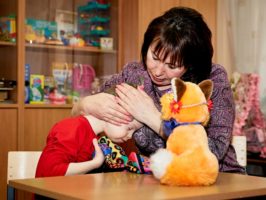 It is also important to take into account that during the project the children formed an attachment to the specialists– they were very glad to see their teachers, waiting for them and in turn not wanting to leave after their sessions. As a rule, in such organisations like these children often do not have relatives. Instead, the child only has a narrow circle of contacts only consisting of educators and nannies, resulting an average of two people per 10-15 children; as well as short-term people in the children’s lives such as defectologists and other specialists. Thus, the time given to each child is of course not enough to form proper bonds or feel genuine attachment.
It is also important to take into account that during the project the children formed an attachment to the specialists– they were very glad to see their teachers, waiting for them and in turn not wanting to leave after their sessions. As a rule, in such organisations like these children often do not have relatives. Instead, the child only has a narrow circle of contacts only consisting of educators and nannies, resulting an average of two people per 10-15 children; as well as short-term people in the children’s lives such as defectologists and other specialists. Thus, the time given to each child is of course not enough to form proper bonds or feel genuine attachment.
Therefore, a specialist of the “Portage” method becomes a close and trustworthy person for the child, often the only one who spends quality time with the child while solely “one to one”, who believes in him or her, inspires and encourages them to go even further when something is done successfully. The project allowed specialists to pay more attention to each child, to better understand what the child likes and what they desire to do, not simply be passed around from one nurse to another so often. The specialists communicated with the children even when the children were sick or not up to par for a session – despite this their personal teachers nevertheless came to visit where they talked and played, which in turn this gave the children the joy of communication, thereby creating favorable conditions for development and recovery. Thanks to this, children began to trust specialists and began to believe in their own abilities!
A good example of the success using the Portage method is Natasha, who initially did not show much interest in studies and made no attempt to interact with her specialist. Yet gradually she began to respond emotionally to the teacher and initiate communication herself, where soon interest to the classes also appeared. During the project Natasha worked out eight skills, the great long term successes – she learnt how to repeat the actions of an adult and eat with a spoon! The girl as a whole became less withdrawn, more smiling and sweet.
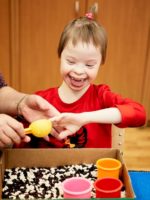
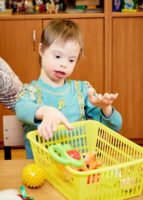
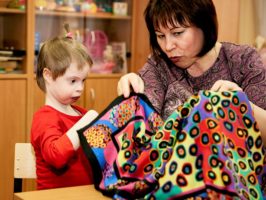
Another case is Dasha who in the beginning had limited contact with her teacher too and was very formal – she turned away and did not join the class. However, gradually she began to respond to the teacher and becoming more open. It turned out that Dasha really liked to walk, and in each session she asked to start it with a walk. By the end of the project she already began to walk with less adult support! In April we organised a consultation with the physiotherapist, Joanne Pritchard, director of ‘The Promise’, our project partner. This meant Dasha has a real chance to start walking alone, people just needed to help her develop her walking skills! By the end of the project, Dasha became more communicative, emotionally responsive and smiling with all people. Additionally she learned to eat from a spoon, play with toys, in total resulting in honing seven essential skills.
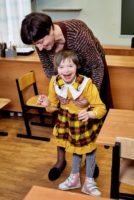
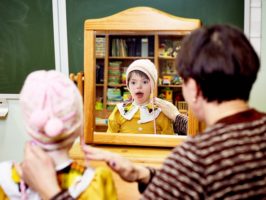
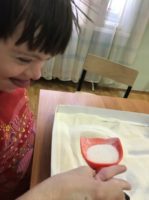
Rustam, who did not walk, speak and showed limited interest to toys did not establish contact with his specialist for a long time. Furthermore, the boy was hospitalized for a month and half towards the end of the Portage project. Yet despite all these obstacles, a lot was achieved with him- such as contact with the teacher was created leading to the young boy to begin to rejoice at sessions. Even more so, he became less withdrawn, more independent and emotionally responsive. With him he gained six skills which was considered a huge success – for example he learned to keep the spoon himself up to, a feat which would have been impossible to consider before the commencing of the Portage project.
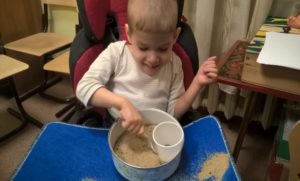
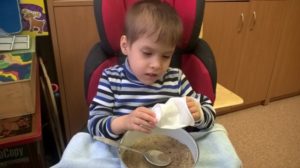
Vanya participated in the project for only two months, but immediately clicked with his specialist leading him to become lively and very sociable, who in turn gladly tried to fulfill all the proposed tasks. Thanks to this project, despite his short time with it, he was able to develop five skills which had a noticeable impact on his development. For example, he can now hold the mug with one hand and drink from it, which will help him greatly in the long run. It is especially valuable that the boy learnt to believe in himself thanks to the love and support from the adults and well as the large amount of resources available for development to stimulate his senses as seen in the photos below.
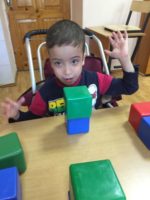
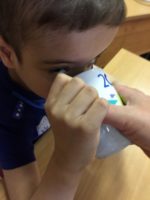
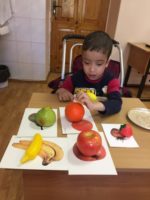
Galya was in the project for two months too. A girl with very severe impairments, great motor problems, as well weak arms and legs which meant she also struggled to hold her head up. Furthermore, she is visually impaired, quickly becomes tired, languid or overly excited. Therefore, a few weeks of work was done only in hopes to identify her existing skills, as it was difficult to understand whether there were responses from the child due to there being a lack of contact with her specialist for a long time.
However miracles are real, as by the end of the project the girl began to smile at the teacher, turn her head towards her and watch her movements, this was the long-awaited emotional contact! While some may say the gaining only about two skills is limited success – for us that is a great leap forward considering the condition of the child. Galya was also inspected by the physiotherapist and was given useful advice on which positions would be convenient for the girl, ensuring proper function of her body.
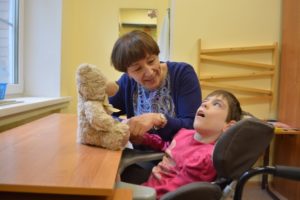
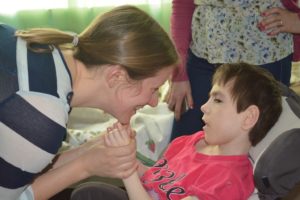
Another brief participant was Maxim who was in the programme for two months as well, who had severe motor disorders. But contact was established quickly – he immediately reacted strongly to his name, fast movements of the body and head made it clear that he was ready for communication. Gradually, he began to respond more calmly to the presence of his specialist, became more relaxed and soon began to be able to focus attention towards his teacher for a short period of time. In total, four basic skills from different spheres were accomplished with him with the physiotherapist also giving recommendations on appropriate positions to use with him.
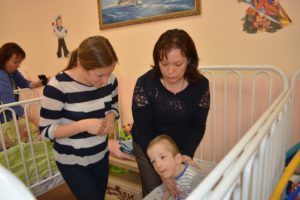
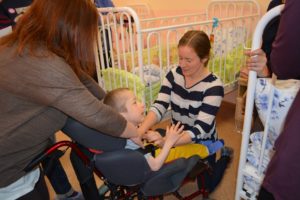
Another important result of the project is the broader representation of the entire staff of the institution on the development of potential seen in children with SMDD. After all, they saw real positive results of the work done and realized that children, even those with very serious disabilities, can develop and that they all need mental stimulation provided by the Portage method very much. Overall, communication with the children has improved meaning we are now able to understand their needs via these sessions which has led to steady development. Furthermore, many of employees who began to help the Portage team during the project now also want to study this method due to its effectiveness!
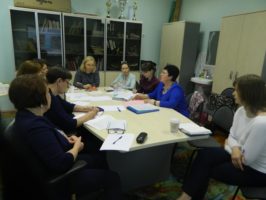 At the end of the project, a meeting was held with the participants of the Portage team, the Director of «Doverie» and the partners who supported us in the project. All the participants were unanimous – the results of the project confirmed the advantages of applying the Portage model due to its relevance, productiveness and the endless benefits for the children themselves of “Doverie”. It was also noted that the team in particular was rather enthusiastic, independent and willing to invest a lot of time and love in their work with the children. Moreover, the director of the orphanage also strongly supported the continuation of the sessions with the children using “Portage”. Hence, in autumn the work will once more resume, continuing with the same process. We also plan to teach another group of staff from «Doverie» who will also eventually start working with the other children there, helping more and more children to discover their potential.
At the end of the project, a meeting was held with the participants of the Portage team, the Director of «Doverie» and the partners who supported us in the project. All the participants were unanimous – the results of the project confirmed the advantages of applying the Portage model due to its relevance, productiveness and the endless benefits for the children themselves of “Doverie”. It was also noted that the team in particular was rather enthusiastic, independent and willing to invest a lot of time and love in their work with the children. Moreover, the director of the orphanage also strongly supported the continuation of the sessions with the children using “Portage”. Hence, in autumn the work will once more resume, continuing with the same process. We also plan to teach another group of staff from «Doverie» who will also eventually start working with the other children there, helping more and more children to discover their potential.
The project was made possible thanks to:
- The donation of the company Boeing – our gratitude is endless for this invaluable help!
- ANO “Promise” (Ryazan),
- charity organization “The Promise” (UK),
- experts from Elatma`s orphanage,
- consultant of the project, teacher-psychologist Krasnokutskaja Ekaterina – for your professional participation, experience and support!
- And we say a big thanks to the director and the whole team of the CSIS “Doverie” – for their enthusiasm, dedication and love for children!
Thanks to all of you the quality of life of children with severe developmental disorders is improving, our gratitude to all who support our cause is endless!
if you are interested in learning more about our Portage method or would like to also contribute to our cause, click this link: https://ddfrussia.ru/en/campaign/portazh/
